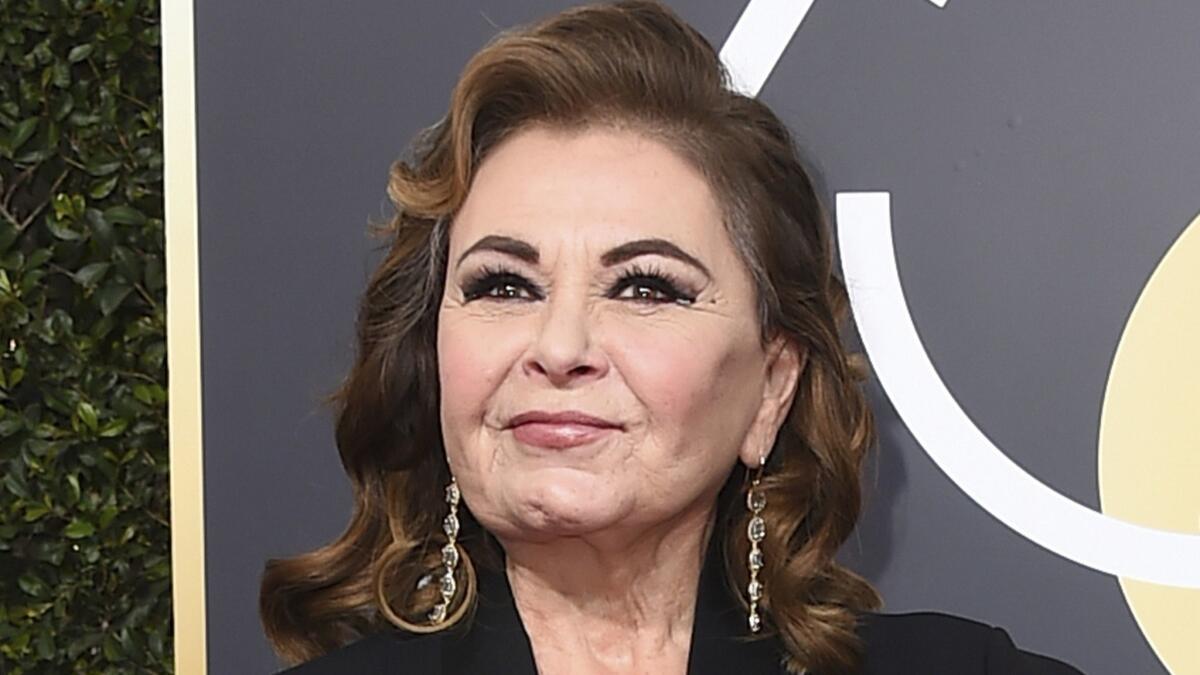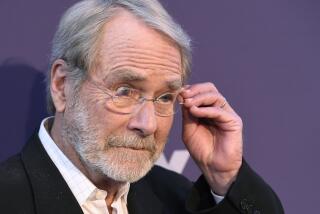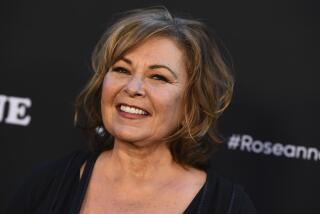Why did Disney take such a big gamble on ‘Roseanne’? Blame the uncertain TV market

- Share via
For a few months, Roseanne Barr put ABC back on top of the television world.
The stunning success of her rebooted sitcom “Roseanne” — reaching nearly 22 million viewers with its debut — reminded the industry of its ability to deliver mass audiences and drive the country’s cultural conversation.
On Tuesday, the turnaround for the Walt Disney Co. unit quickly became one of the most humiliating moments in its history as the top-rated “Roseanne” was canceled following her racist tweet about former Obama administration official Valerie Jarrett. Disney Chief Executive Bob Iger called Jarrett to apologize for the slur.
Depending on a provocative and often unpredictable star such as Barr — who had the benefit of mass success in the pre-digital TV era of the 1990s — was a gamble and ABC executives knew it. The fact they were willing to take such a risk demonstrates just how hungry they were to recapture some of the network’s past glory that had been dimmed in recent years by the public’s shift to streaming online video and on-demand viewing.
ABC held firm in its decision Wednesday amid criticism from President Trump, an ardent fan of the show, who said Iger had never apologized to him for the “HORRIBLE statements made and said about me on ABC.”
White House Press Secretary Sarah Huckabee Sanders elaborated on Trump’s statement, suggesting there was a “double standard” for liberal commentators such as “The View” co-host Joy Behar and ESPN’s Keith Olbermann who have ridiculed Trump or his supporters. Both work for Disney-owned media entities.
But Disney ABC Television Group President Ben Sherwood stood by the cancellation decision in an email to staff. “In the end, it came down to doing what’s right and upholding our values of inclusion, tolerance, and civility,” he said.
ABC will take a financial hit from the abrupt loss of “Roseanne,” which was the most-watched program of the last season among the advertiser-coveted audience of 18-to-49-year-olds and became the centerpiece of the network’s 2018-19 prime-time schedule. But the cancellation is not expected to significantly dent the profit of its Burbank-based parent.
“It won’t be noticeable,” said Brian Wieser, media analyst at Pivotal Research Group. “It’s not a given it was going to be a profitable show in its own right.”
The network was set to pay about $4 million an episode to license “Roseanne” from Carsey Werner Co. — more than twice as much as it would typically pay for a sitcom from a studio outside of Disney, according to people familiar with ABC’s deal for the program.
Kantar Media estimated that “Roseanne” took in $45 million in ad revenue during its brief run this last season, and pegged it to take in $60 million over 13 episodes next year.
But even a modestly profitable “Roseanne” would have the additional value of bringing well over 10 million viewers into the Tuesday 8 p.m. time period and boosting ABC’s audience circulation through the rest of the night. That would have helped launch the network’s new series “The Kids Are Alright,” another family-based comedy, and “The Rookie,” a broad-appeal police drama fronted by an established TV star, Nathan Fillion.
“She blew up their schedule on Tuesday nights,” said analyst Laura Martin of Needham & Co. “There’s more uncertainty about what the ratings will be in that slot.”
In the months leading up to the launch of “Roseanne” in March, executives knew that there was the possibility that Barr could immolate her program with an ill-timed tweet, according to people familiar with the discussions.
Barr had indulged in social media discussions about right-wing conspiracy theories that circulated on the web in recent years. Despite presenting a liberal progressive viewpoint on her original show that ran from 1988 to 1997, she had become an ardent Trump supporter.
Barr was also not a walk in the park her first time around as an ABC star. She alienated a large chunk of her audience in 1990 when she delivered an off-key version of the “Star Spangled Banner” — followed by some crotch grabbing — at a San Diego Padres game.
In the early 1990s, she threatened to walk away from “Roseanne” unless ABC gave her then-husband Tom Arnold his own show that would air after her program, getting the benefit of its massive audience lead-in. Iger, who was president of the network at the time, was well aware of that history.
In 2013, Barr compared National Security Advisor Susan Rice to an ape, similar to the racist slur she used against Jarrett.
Still, the idea of a “Roseanne” revival became more appealing as revived versions of past TV hits such as “Full House,” “Gilmore Girls” and “Will & Grace” were drawing viewers. Title recognition became a way to cut through in the increasingly crowded program environment where viewers have more than 400 scripted series at their fingertips.
Barr also had the ability to speak to working-class viewers in a way that they were not hearing in sitcoms and dramas, where writers are more likely to come from Ivy League universities than the hinterlands.
“The woman still has an authentic voice that America responds to,” said Ted Harbert, a veteran network TV executive who worked with her in the 1990s at ABC . “Roseanne understood the working class - struggling for money, things are always tough and still we laugh about it at the end. The big cackle at the end of the main title is the key to the show. Things are rotten, but we still laugh about it.”
The power of that formula was still potent when the rebooted “Roseanne” debuted in March after a massive publicity blitz that pulled at the nostalgia strings of the 1990s. Subway cars in New York were decorated to look like the Conner family living room depicted in the program.
Barr’s Twitter habits were monitored and discussed with growing concern by ABC executives in the weeks leading up to the “Roseanne” launch and afterward. She used social media to blast Trump’s opponents and pushed the boundaries — such as falsely accusing Parkland, Fla., shooting survivor David Hogg of giving a Nazi salute — which reportedly led to some warnings but no apparent sanctions.
While the short-lived success of the rebooted “Roseanne” showed the power of TV’s established brand names, it also demonstrated that formulas from the industry’s past may not always be built for today’s social media filter, where every statement from a star can be analyzed and debated.
Barr came from an era of TV when sitcoms were built around the personas that stand-ups created in smoky, private comedy clubs not subject to social media scrutiny. Having her name in the title also made her de facto boss of the program, giving her tremendous control over its creative direction.
After “Roseanne” and other shows built around stand-ups moved on, networks have favored ensemble comedies in recent years — “How I Met Your Mother,” “The Big Bang Theory” and “Modern Family” — which are not dependent on eponymous stars — or their regrettable tweets.
“When you’re talking about the star of the No. 1 show, you’ll put up with a lot of crazy,” said a top television executive who works for an ABC rival. “There may be a nagging voice in the back of your head about her past behavior. But you see the numbers and you say, ‘The public likes it.’ ”
Twitter: @SteveBattaglio
Times Staff Writer Ryan Faughnder contributed to this report.
More to Read
Inside the business of entertainment
The Wide Shot brings you news, analysis and insights on everything from streaming wars to production — and what it all means for the future.
You may occasionally receive promotional content from the Los Angeles Times.











